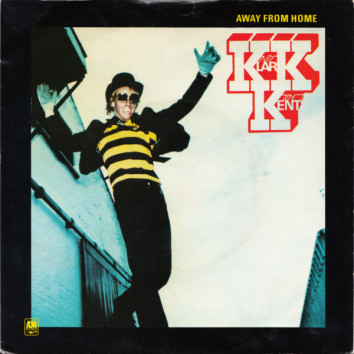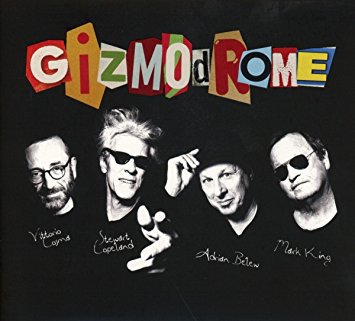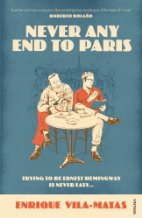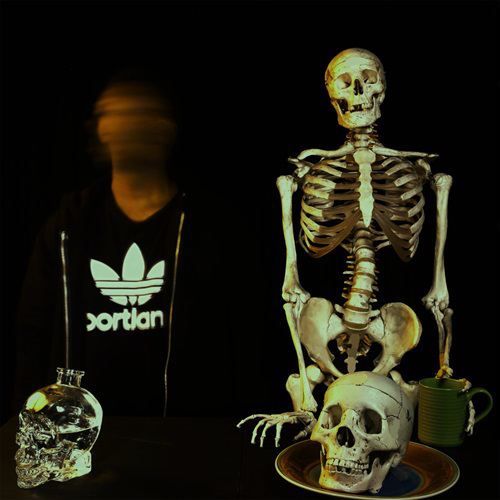
Who could this mystery man with the terrible logo possibly be?
When I was 10, I had a fairly memorable dream. I was at the arcade, which for whatever reason now had a jukebox, and I was flipping through all the CDs and came across an album by The Police that I had not seen before. I remember the cover looking something like Reggatta de Blanc, but palette-shifted. Since The Police were my favorite band at the time (overwhelmingly so, in fact…I rarely listened to anything else) I immediately put all my quarters into the box and played all the songs in order. There were 12 of them; for some reason I can remember that. The first song started playing and…I woke up. So I just laid there, trying to remember the melody of the song, or anything on the tracklisting, then figured if I went back to sleep maybe I could recapture it. Nope. Lost forever in the deep recesses of my mind. Granted, had I stayed asleep, I probably would have found that all 12 songs sounded an awful lot like “Roxanne”. But, still, that’s the kind of dream that excites you as a young kid. An entirely unheard album by your favorite band!? What could be better?
It turns out, something like that actually did exist. Well, two things, actually. One was the Message in a Box set, containing about an album’s worth of B-sides, which I very much was obsessed with once I found a copy of it in the library. Within the booklet of that set there was a mention of an album by “Klark Kent”, which was essentially a Stewart Copeland solo album, released sometime after Zenyatta Mondatta. I always liked Copeland’s songwriting contributions so this became a must-have for me. Unfortunately, no shop in town carried it or could even put in an order – the album was never released on CD. To this day it remains a rare find.
[Side note: I am aware of the archival release by “Strontium 90”, which features an early version of The Police plus Mike Howlett of Gong. I actually bought it with my allowance money in 1997 and thought it was alright, but it didn’t really sound much like The Police. Oh well.]
Anyway, it’s too bad I never found it, because I later happened upon an MP3 copy of Klark Kent’s Kollected Works, and it was exactly what I was hoping for. It contained the entire album and more – almost everything Copeland did under that moniker (it’s missing “Yo Ho Ho”), and then some – several of the songs were only available on extremely rare 7 inches. One would think this compilation would be readily available, given it was released in 1995, which was right around when I would have been looking for it. But IRS Records went defunct shortly after its release – I believe this is the last album they ever put out. Copies nowadays can go for triple figures.
So, here’s the story of Klark Kent: back in the early days of The Police, Copeland was just as prolific a songwriter as Sting was, but due to Sting’s role as the frontman and the fact that he was writing all the hits, Copeland’s songs often got kicked to the curb. After having song after song get rejected by Sting, he decided to just go into the studio and record them himself, playing all the instruments as well as singing. In order to not distract too much from The Police he decided to go under a pseudonym, though as I understand it pretty much everyone figured out who it was right away. In 1978 he hit the charts with “Don’t Care” (#48), and two years later released a 10-incher on green vinyl. Eventually due to copyright issues he had to change his name to “Klerk Kant”, and that was basically the end of it.
Kollected Works compiles the eight tracks from the 10-inch, his debut EP, some B-sides and a few rare tracks which were recorded several years later under Copeland’s own name. I’ll put it this way – if you liked Copeland’s contributions to Reggatta – “Contact”, “On Any Other Day”, and “Does Everyone Stare”, then you will probably like this as well. It’s goofier than any Police LP, but also a lot more fun, even catchier than your standard Police fare. Almost got an early Joe Jackson vibe to it in spots. This album should appeal to the standard Police fan more than any of Sting’s solo discs, since the arrangements and tight-knit playing are very close to what The Police did, especially on their first three. Maybe Copeland’s voice ain’t all that – it’s a little nasally and flat, but what can you do, especially when you write this stuff with Sting’s voice in mind?
Amusingly enough I kind of prefer this to the actual Police albums these days, even if only because I’ve heard all of them a hundred times by now. One thing you notice when you start listening to Copeland’s work is that he’s actually got a unique songwriting voice; his tracks will come up on shuffle and I’ll be able to recognize who it is even without knowing the album or the track. I’m not sure how to describe it – he tends to take the catchiest part of a piece and bring it to the forefront, and uses a lot of plastic-sounding keyboards to highlight the melody. He often uses deceptive rhythms, often doing that reggae-style thing that emphasizes the backbeat. It’s more complex than it seems but he likes to keep the arrangements simple. Granted, this style reveals itself more on his subsequent discs (check out the Rumblefish soundtrack or The Rhythmatist to really get a sense of what I’m talking about here) – here he’s still kinda just trying to write Police songs, and for the most part it’s a success. I don’t really see Sting belting out “Too Cool to Kalypso” nor the snotty “Away From Home”, but on some other songs you can hear it. They’re a bit punky and there’s not a single tune on here to be taken seriously, outside of perhaps the brilliant proggy instrumental “Theme for Kinetic Ritual”. If you’ve got a keen ear you can pick out bits that would appear later on – parts of “Excesses” and “Grandeliquent” were later used on the Rumblefish soundtrack, and the long instrumental “Office Talk” got folded into “Bombs Away”. Also, I’m pretty sure that two of the previously unreleased songs here (“Strange Things”, “Stay Ready”) were intended for The Rhythmatist, as on the former you can hear a part of that record on the fade.
Anyway, highlights…highlights. Well, “Too Kool for Kalypso” is mighty bouncy (with kazoo!), “Love Lessons” sounds like The Outfield, “Away From Home” has the dinkiest keyboard line (in a good way), and “My Old School” and “Stay Ready” are two of the catchiest songs I’ve ever heard. Lots of tunes have cool riffs – “Thrills”, “Grandeliquent”, “Ritch in a Ditch”, etc. Plus, the instrumentals “Kinetic Ritual” and “Office Talk” are seriously addictive, making you wonder what might The Police could have been had they leaned further in this direction. Hell, I might as well name everything, right? For the record I am not a fan of “Don’t Care”, but that’s the one that made the charts, so what do I know.
Unfortunately, Copeland never really pursued this direction – he wrote a fairly successful pop song in ’85 (“Don’t Box Me In”) but that was pretty much it. He’s been fairly active since The Police went defunct, but he doesn’t really have solo albums – nearly everything save The Rhythmatist is a soundtrack, and I think a lot of that was never even put out commercially. He did like four hours of music for various Spyro the Dragon games and a lot of that was really excellent. And what about Good Burger? He’s the primary composer but doesn’t even appear on the soundtrack album. Uh….no??? So if you’re a fan, it’s kind of a mess.
Fast forward to the present day, and it appears that Copeland is active again, playing in a new old-guy supergroup called Gizmodrome, featuring Adrian Belew (fresh from getting booted from King Crimson), Mark King, the singer and bass player from Level 42, and Vittorio Cosma, who apparently was in PFM, though as far as I can tell he was a touring member only. Copeland is no stranger to the supergroup format, with stints in bands like Animal Logic and Oysterhead, drumming alongside established singers and songwriters. But Gizmodrome is a bit different, in that the band revolves around Copeland; he clearly writes most of this material and for whatever reason puts himself in the lead speak-singer role, despite the presence of two actual singers in Belew and King.
 In other words, Gizmodrome is basically Klark Kent with a real band, even re-recording two old tunes, “Stay Ready” and “Strange Things”. Although the lineup gives the impression that this is some sort of prog rock supergroup, the tunes are fairly tight-knit; outside of “Spin This”, everything is four minutes or less, and all the soloing is well contained. They generally follow a traditional verse-chorus structure, with Copeland handling the verses, while Belew and King sing the chorus. While I’m not really familiar with King or Cosma, I can definitely hear Belew – that Talking Heads/King Crimson style bird-guitar noise is all over this album. The band’s talent is certainly on display; Copeland hasn’t lost a step since his Police days, King’s bass has a lot of power (plus, he’s a pretty good slapper), and Cosma provides a lot of “coloring”, in the way drowned-out keyboardists tend to do. And of course, lots and lots of tasty guitar bits, as you’ll find on anything Belew involves himself with. But this is still a song-oriented project, centering around Copeland’s offbeat songwriting style. That means lots of quirks – shouted bits that randomly slip in and out of accents, little time-shifts, offbeat lyrics, and arrangements that switch up every few bars. To be fair I think that last one is mostly Cosma’s doing, given the way he’s credited on the album, but still – Copeland’s been trawling down this path his entire career. If not for a lucrative career scoring films and TV shows, his discography would have a dozen albums like this.
In other words, Gizmodrome is basically Klark Kent with a real band, even re-recording two old tunes, “Stay Ready” and “Strange Things”. Although the lineup gives the impression that this is some sort of prog rock supergroup, the tunes are fairly tight-knit; outside of “Spin This”, everything is four minutes or less, and all the soloing is well contained. They generally follow a traditional verse-chorus structure, with Copeland handling the verses, while Belew and King sing the chorus. While I’m not really familiar with King or Cosma, I can definitely hear Belew – that Talking Heads/King Crimson style bird-guitar noise is all over this album. The band’s talent is certainly on display; Copeland hasn’t lost a step since his Police days, King’s bass has a lot of power (plus, he’s a pretty good slapper), and Cosma provides a lot of “coloring”, in the way drowned-out keyboardists tend to do. And of course, lots and lots of tasty guitar bits, as you’ll find on anything Belew involves himself with. But this is still a song-oriented project, centering around Copeland’s offbeat songwriting style. That means lots of quirks – shouted bits that randomly slip in and out of accents, little time-shifts, offbeat lyrics, and arrangements that switch up every few bars. To be fair I think that last one is mostly Cosma’s doing, given the way he’s credited on the album, but still – Copeland’s been trawling down this path his entire career. If not for a lucrative career scoring films and TV shows, his discography would have a dozen albums like this.
As for the album itself, it’s really quite solid – 12 tracks, no weak points, and enough variety in the songwriting to keep a person entertained the whole way. Despite all the trickiness going on in the playing, it’s an easy listen – most of these songs are pretty catchy on their surface (“Man in the Mountain”, “Sweet Angels”, “Zubetta Cheve”) and there’s plenty to listen to on any given tune (as usual, Copeland’s drumming tends to steal the show). The main downside is Stew himself, whose spoken-word style of singing is sort of a distraction, and his lyrical side hasn’t exactly improved much over the last four decades. But that’s all part of the deal; to have a “real” singer would shift the band’s focus, maybe not in a good way. My picks – “Stay Ready”, a tune I’ve always loved, “Man in the Mountain”, which I can’t get out of my head, and the closing instrumental “Stark Naked” which brings back memories of his best soundtrack work. It is actually a revived Curved Air track, though the original is very different from what you get here.
Somehow I doubt Gizmodrome is going to appear on too many year-end lists; these sorts of quirkjobs from seasoned vets rarely do, and I think Copeland in particular tends to get on people’s nerves sometimes. If you ever hear an interview with him, he’s humorous but not laugh-out-loud funny, he’s entertaining but he tends to suck the air out of the room, coming across sometimes as the guy who talks the most despite having the least to say. His music can often mirror his personality – it’s often self-consciously odd, trying hard to impress rather than just letting the music speak for itself. But the man knows what he’s doing – even if Sting wrote most of the songs, it’s hard to listen to Copeland’s work without suspecting that The Police actually revolved around him. If you’re looking for that something that the Police had, Copeland’s work is the best place to find it. His catalogue is kind of scattershot, with few “proper” solo efforts and only one real consensus pick (Rumblefish). But this is as good as anything he’s done – a real kick in the ass to what these aging-vet supergroups generally tend to be.
Advertisements Share this:




